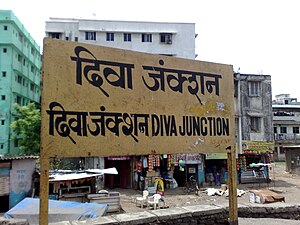Diva Junction railway station
This article has multiple issues. Please help improve it or discuss these issues on the talk page. (Learn how and when to remove these template messages)
|
Diva Junction railway station is a junction between Mumbra and Kopar that is situated in Maharashtra state, in India. It was opened on 3rd April 1867.[3]
This is a major junction in the Central Railway of Mumbai. One end of the Asia's one time third largest Parsik tunnel (1.3 km) built during the British Rule (1916) in India ends at Diva. The east part of Diva station is Sabe and west is Diva. It provides access to north, Western Railway and towards Panvel, Roha and further towards Konkan Railway and south, and also to Alibaug and JNPT, via Vasai Road–Roha line.
From 18 December 2016 fast local trains halt at Diva. Few passenger trains towards Konkan Railway also halt at Diva Junction.
Diva, once a small village in the Agari and Koli community near the Ulhas River, has experienced significant growth since 2004 due to Mumbai's expansion. Originally consisting of several small villages like West Diva, Sabe, Tatiwali, and Agasan, the area has seen its population rise from about 4,000 to around 500,000. The local community, primarily Marathi Konkani with members from UP, Gujarat, and South India, depends heavily on trains for commuting.
Diva has developed its railway infrastructure, now boasting four platforms—two for slow trains and two for fast trains—compared to the original two. However, the city still faces challenges related to infrastructure and amenities. There is a need for better roads, improved connectivity, enhanced drainage systems, government healthcare facilities, educational institutions, parks for senior citizens, playgrounds for children, and improved public transportation to meet the needs of its growing population.
References
[edit]- ^ History
- ^ "It's not getting any better! Despite metro and monorail, Mumbai local trains getting more overcrowded". mid-day. 11 April 2017. Retrieved 13 April 2017.
- ^ "[IRFCA] CR Mumbai Timeline of Suburban Stations". www.irfca.org. Retrieved 25 April 2024.


